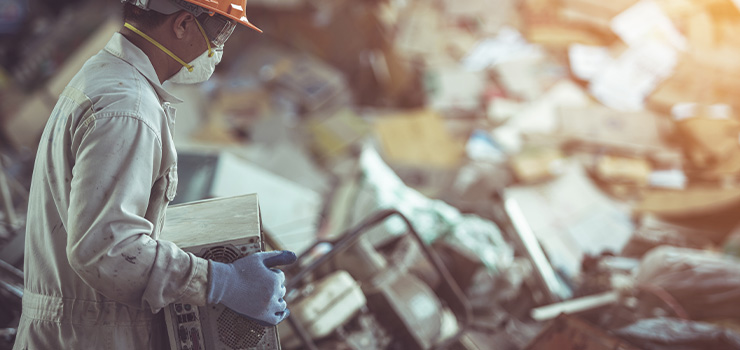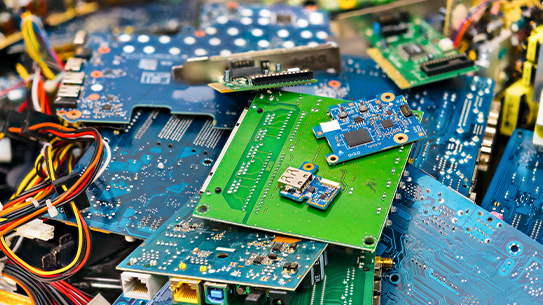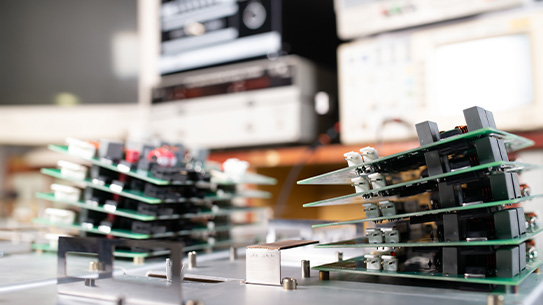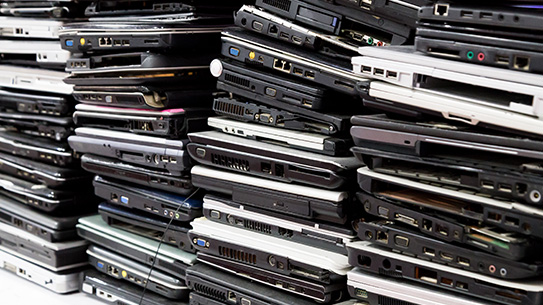What is WEEE?
Electrical waste and electronic equipment should be disposed of in a secure and environmentally-friendly way at every opportunity. Stone Group's award-winning, WEEE-compliant recycling facility ensures this is done correctly for your IT assets when they reach the end of their lifecycle.


The WEEE Directive
WEEE includes virtually any household or non-household equipment that uses a battery or plug. It relates to when that equipment is end of life.
In the modern world, our devices and appliances quickly become outdated as a new, improved version becomes available. Too often, the old devices are carelessly thrown out and end up in landfill.
This unnecessary waste takes up a lot of space in landfill sites, but there is a more dangerous side effect. Many electrical and electronic items release harmful toxins into the air and water, which can be extremely damaging to the environment and human beings.
In 2002, the WEEE Directive was introduced in an attempt to address these environmental concerns.
Complying with WEEE Regulations
Virtually every business is affected by WEEE Regulations. It is essential that you understand and carry out your responsibilities.
WEEE Regulations compliance is essential if your business:
- Distributes, sells, imports or manufactures any electrical or electronic equipment (EEE)
- Repairs or refurbishes WEEE
- Treats, reprocesses, recovers or recycles WEEE
- Produces any WEEE
The WEEE Directive also applies to all producers and distributiors, big or small. A producer is defined as one of three things; a business that manufactures and sells WEEE under its own brand, a business that resells rebranded WEEE products, any business importing or exporting WEEE into the UK or an EU member state professionally. A distributor refers to companies that sell WEEE for household use through; physical retail/wholesale outlets, the internet, TV shopping channels or other distance-selling systems.
Why Does WEEE Recycling Matter?
Each year, as much as 2 million tonnes of WEEE items end up in landfill when they could easily be recycled. With many harmful materials in their assembly, electronic devices in landfill cause significant environmental damage. They:
- Contaminate surrounding areas
- Kill living species
- Take up a lot more space than most other landfill waste


How can my business comply with WEEE Recycling responsibilities?
There are many, many types of WEEE items. Virtually all household appliances are included, as well as items like monitoring equipment, medical devices and certain toys.
Most businesses have certain electrical items that are regularly replaced. These include:
- Desktop computers and monitors
- Laptops
- Computer keyboards and mice
- Telephones (landline phones and video conferencing equipment)
- Mobile devices (smartphones, tablets, etc.)
- Printers, scanners and photocopiers
- WiFi routers
The WEEE Directive means that the business types listed in the previous section must provide their customers with a facility to recycle their WEEE once they have purchased new equipment. This is done either through a collection service or a convenient drop-off point.
If you need to dispose of several electrical/electronic items at the same time, it is best to go with a reputable waste disposal company. Stone offers a collection service free of charge*, putting your security and environmental protection at the forefront of the entire process.
Book a collection and leave it with us - there will be complete traceability for the entire process.
*Free collection subject to minimum requirements.
Why Does WEEE Recycling Matter?
Each year, as much as 2 million tonnes of WEEE items end up in landfill when they could easily be recycled. With many harmful materials in their assembly, electronic devices in landfill cause significant environmental damage. They:
- Contaminate surrounding areas
- Kill living species
- Take up a lot more space than most other landfill waste


Data Protection
What's more, WEEE Regulations relate to data security, which is incredibly important now that GDPR is in effect. It is illegal to send IT equipment to landfill without following strict WEEE guidelines. Failure to comply could result in a huge fine.
A professional and reliable IT disposal centre, like Stone Group, can ensure your equipment is recycled properly. This means you will receive paperwork confirming that all data contained on those devices is destroyed and cannot be exploited by any malicious actors.
Learn more about the importance of recycling in this article.


WEEE Recycling You Can Rely On
Stone Group has an award-winning, WEEE-compliant recycling facility. We are a zero landfill business and with our help, your end-of-life assets will be recycled securely in an environmentally-friendly way.
If you are interested in recycling your assets with Stone, or would like to learn more about what we do, contact us. Our team of friendly experts will be happy to help.




Data Protection
What's more, WEEE Regulations relate to data security, which is incredibly important now that GDPR is in effect. It is illegal to send IT equipment to landfill without following strict WEEE guidelines. Failure to comply could result in a huge fine.
A professional and reliable IT disposal centre, like Stone Group, can ensure your equipment is recycled properly. This means you will receive paperwork confirming that all data contained on those devices is destroyed and cannot be exploited by any malicious acts.
Learn more about the importance of recycling in this article.
WEEE Recycling You Can Rely On
Stone Group has an award-winning, WEEE-compliant recycling facility. We are a zero landfill business and with our help, your end-of-life assets will be recycled securely in an environmentally-friendly way.
If you are interested in recycling your assets with Stone, or would like to learn more about what we do, contact us. Our team of friendly experts will be happy to help.



